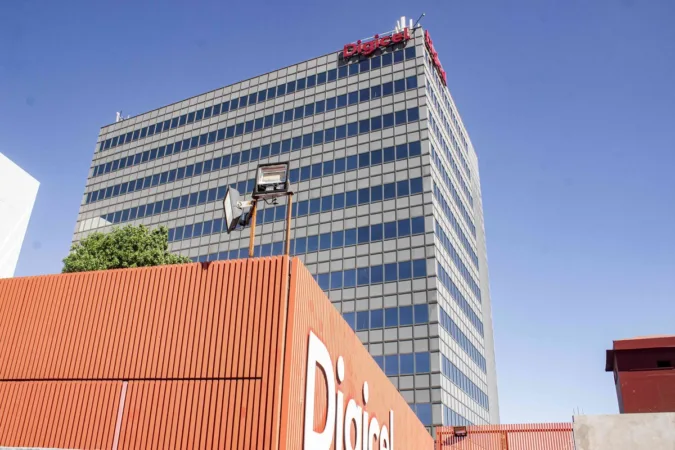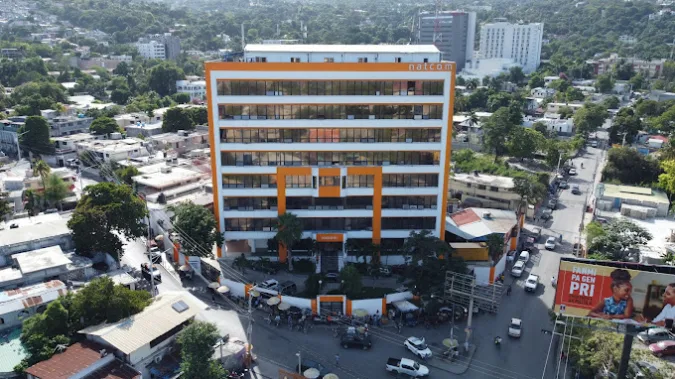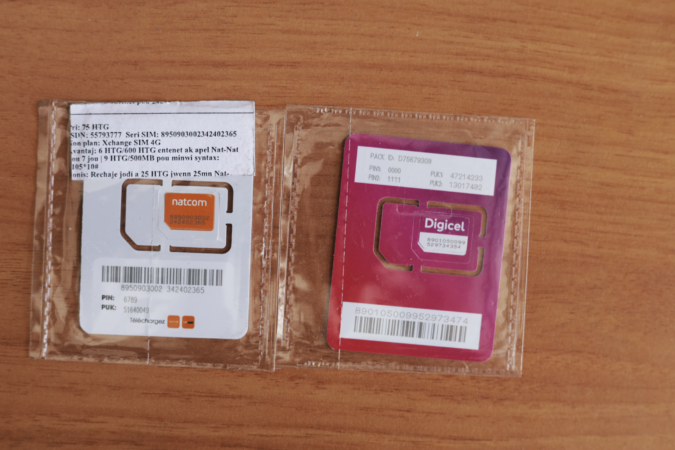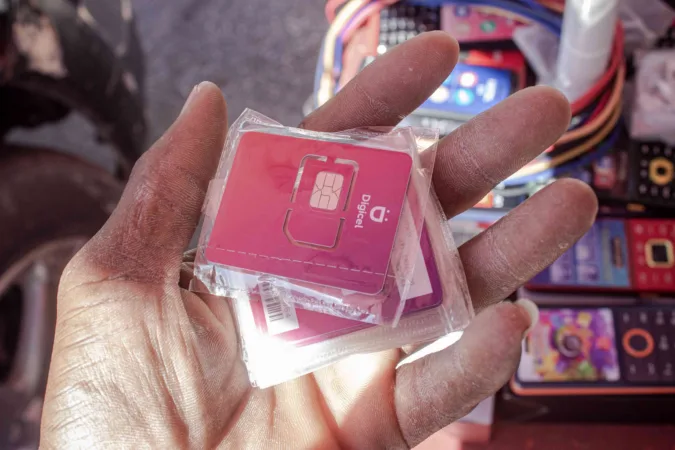Despite directives from CONATEL, the SIM cards from both communication giants in Haiti continue to be sold without registration, observes AyiboPost
In January 2024, AyiboPost met around twenty SIM card resellers in Turgeau, in front of the head offices of Digicel and Natcom, as well as at the Carrefour de l’Airport and Rue Rivière, who claim that they sell SIM cards from both companies, sometimes dozens at a time, without requiring a valid ID, which goes against regulations put in place by the National Telecommunications Council (CONATEL).

The headquarters of Digicel company in Turgeau. | © Jean Feguens Regala/AyiboPost
These illegal sales as well as the systematic non-identification of numbers in use on both networks often jeopardize the work of investigators from the Central Directorate of the Judicial Police (DCPJ), in a context of heightened crime.
Two DCPJ investigators revealed to AyiboPost that they are having difficulty moving forward with investigations due to the use by criminals of unregistered SIM cards. They request anonymity for fear of reprisals from the companies.
“Some kidnappers use dozens of numbers, and generally, they are not registered anywhere,” a DCPJ investigator told AyiboPost.
“Certain investigations are at a standstill because of this,” continues the source, who accuses telecom companies of “unwittingly participating in the worsening of the phenomenon of insecurity in the country.”
Most bandits and their accomplices buy a lot of SIM cards and use them once, according to another DCPJ investigator who questions the unrestricted sale of Digicel and Natcom chips on the street.

Top view of the Natcom company headquarters.
These sales are easily carried out in broad daylight, raising questions about CONATEL’s power and willingness to enforce its own directives.
According to CONATEL rules, the activation of SIM cards can only be done after “registration and verification of user information in the operator’s database.”
On January 18, 2024, AyiboPost obtained two SIM cards respectively from Digicel (34643064) and Natcom (55793777) from street vendors in Port-au-Prince without presenting identification. The journalist was then able to use these SIMs to make calls, without any restrictions by the companies.

Natcom and Digicel SIM cards purchased by AyiboPost from street vendors in Port-au-Prince without the presentation of identification documents.
The partnership between the DCPJ and telecommunication companies allows the institution to find geolocated data or track the unique number attached to a phone, even if the SIM card has been changed.
According to a source familiar with the operations of the regulator, the real problem for the judicial police lies in their inability to physically go to certain areas that are completely controlled by bandits.
While this source acknowledges that SIM identification is an obstacle in the pursuit of certain investigations, it also points out that the systematic deactivation of chips without information would constitute a significant loss of earnings for companies, in a context where their equipment and infrastructure is repeatedly vandalized.
These illegal sales as well as the systematic non-identification of numbers in use on both networks often jeopardize the work of DCPJ investigators, in a context of heightened crime.
CONATEL introduced its first measure aimed at curbing the massive and disorderly sale of SIM cards in the country in 2012.
In this directive published in the official journal Le Moniteur in August, CONATEL prohibited any buyer from acquiring ten SIM cards in a single transaction. Nor could operators sell more than 60 chips to a single reseller.
Read also: Des cartes SIM vendues sans contrôle dans les rues utilisées par des criminels
Despite CONATEL’s appeal, the disorder continued. This forced the regulatory body to issue a second directive in November 2020 to reiterate the importance of respecting decisions linked to user identification, against a backdrop of widespread media coverage of cases of kidnapping, abuse and threats.
In the text published in the official journal in 2020, the regulator prohibited the sale of SIM cards without the presentation of an ID or a valid passport and subsequently requested the identification of all activated SIM cards.
The directive also requires the signing of a justification form for any purchase by a user of more than five SIM cards. It requires verification of information before any activation, and requires Digicel and Natcom to “trace” the sale of the chips.
Despite CONATEL’s appeal, the disorder continued.
Haiti has a problem identifying its citizens. At least three million people do not have a birth certificate and millions more do not have an identification card.
Read also: The Haitian state runs for 20 years without counting the population
To overcome this problem, the 2020 CONATEL directive allowed an interested party without identification documents to be accompanied by a witness with an identification document of their own for the purchase of a SIM. The parents of minors can also, according to CONATEL, buy them a chip.
The sale of SIMs without an identification document makes Haiti unique in the vast majority of Latin American and Caribbean countries.
In November last year, Honduras sanctioned the country’s two telecommunications companies for failing to comply with the requirement to record information about SIM card buyers, according to an article in El Informativo. According to experts cited by this outlet, the irregular sale of SIM cards has a direct impact on the severity of insecurity, because it facilitates the planning and execution of criminal acts.
Some kidnappers use dozens of numbers, and they are usually not registered anywhere.
On the other side of the border, in the Dominican Republic, you must have identification to obtain a SIM card.
A Salvadoran woman, visiting the DR for a week in 2021, told AyiboPost that she was unable to buy a SIM because the company in question required five days to add her information to the database with her passport. This registration is mandatory to validate the purchase, she was told.
In El Salvador, where Digicel operates, the requirement for an identification document also remains strict.
And in Cuba, foreigners and locals must present identification to buy a SIM card in a market totally controlled by the state, according to an AyiboPost journalist visiting this country in December 2022.
The entity responsible for telecommunications in Haiti, CONATEL, did not respond to requests for comment forwarded via email and telephone to its communications manager before publication.
On January 22, 2024, at around 2 p.m., AyiboPost went to the head offices of Digicel and Natcom to ask how a potential customer could purchase 100 SIM cards.

The location of Digicel in Turgeau. | © Jean Feguens Regala/AyiboPost
“You just need an ID, then you can buy the quantity you want, and customers can come and register themselves,” responded an employee at the showroom located at the entrance to the Digicel administrative building.
Inside the building, AyiboPost was able to get the sales manager’s contact information.
Reached via telephone, the Digicel representative said: “If it is for business, you won’t need an identification card, because the SIMs are pre-activated. You can start with 250 cards. (…) But, for now, after the purchase, I will simply visit your company.”
This way of proceeding seems to go against CONATEL regulations. The Council requires the verification of customer information “before” the activation of any SIM cards.
On the other side of the border, in the Dominican Republic, you must have identification to obtain a SIM card.
A similar situation arises with Natcom. “To become a reseller, you just need to have the money,” declares a company representative, met on site.
“Several options are available to you,” continues the employee. You can either purchase already activated SIM cards that expire in three months, or acquire SIMs that allow you to identify your own buyers through the MBCCS app. In this case, the buyer can go directly to the company for activation, but it will be at their discretion.”
Read also: Digicel affirme ne pas pouvoir écouter les appels de ses clients
Out of thirteen sellers contacted around Carrefour Aéroport for the purchase of a Digicel or Natcom SIM card, none require an identity document.
“Usually, I don’t ask customers for any identification documents, you just have to pay for the SIM and everything is OK,” Gerald Alexis, an authorized MonCash agent and SIM seller in Drouillard, told AyiboPost.
The same goes for Daniel Bertrand, a Digicel and Natcom SIM card trader, met near the Natcom locale on Avenue Martin Luther King.
“I do not require identification when selling my SIM cards, because this practice is no longer current,” says Bertrand. If someone wishes to register their SIM, they must do so directly with the company,” maintains the man who says he has been doing this job for around five years.

SIM cards from Digicel company are being sold in front of the main office premises in Turgeau.
Cherlin, a Natcom SIM card reseller at Carrefour de l’Airport, sells his chips without identification documents. “I can buy 50 SIM cards for my business and I am not asked for ID at the time of purchase. Besides, the SIM cards are already activated, so there is no need for the buyer to provide ID, Cherlin tells AyiboPost.
A significantly different situation can be observed at Posse Multi-services on Avenue Martin Luther King. “For Digicel SIM cards, I do not ask for identity documents, but for Natcom SIMs, yes, since sometimes we are obliged to register them,” a business manager we met on site told AyiboPost.
The sale of SIMs without an identification document makes Haiti unique in the vast majority of Latin American and Caribbean countries.
The two companies were contacted without success through their representatives and via email before publication.
In the wake of the 2020 CONATEL directive, Digicel and Natcom announced the release of two applications, DICUREG and MBCCS respectively, to allow sellers to record information regarding SIM card buyers such as the photo of their identification cards. The sellers met for this article do not use these applications. It is not clear why their use is not enforced in the sale of chips.
“DICUREG from Digicel has not been working for more than a year,” according to a project manager from L’Eternal Multi-Services, a Digicel SIM card sales agency on the airport road. “If you want 1,000 SIM cards, we can provide it to you,” confides a representative of the institution. The latter asks for identification for the buyer, but nothing in the way of documentation for the supposed company he represents.
Gerald Alexis, an authorized MonCash agent, said he had never heard of the DICUREG application when shopping for SIMs.
MBCCS appears in the Play Store, but users complain of difficulties using the application and its erratic performance, according to public comments read online by AyiboPost.
[metaslider id=55235]
By Lucnise Duquereste & Widlore Mérancourt
English translation by Sarah Jean.
Stay in touch with AyiboPost through :
► Our WhatsApp channel : click here
► Our WhatsApp Community : click here
► Our Telegram canal : click here







Comments